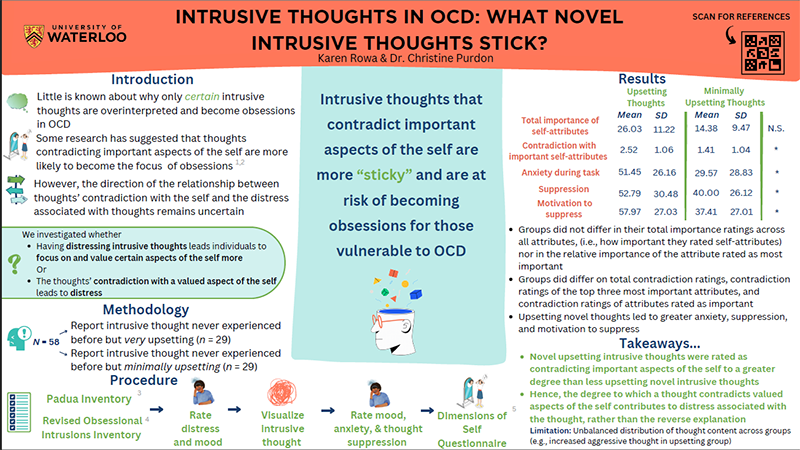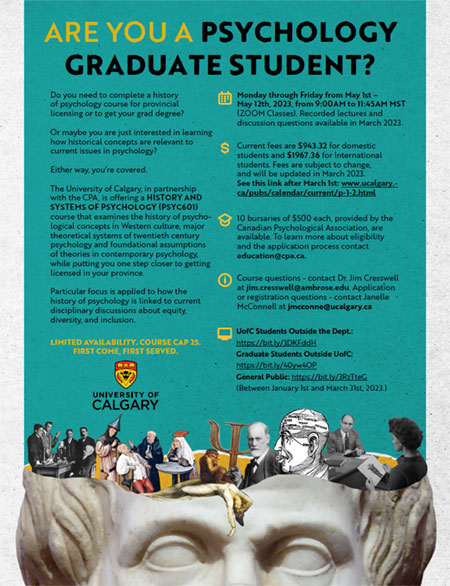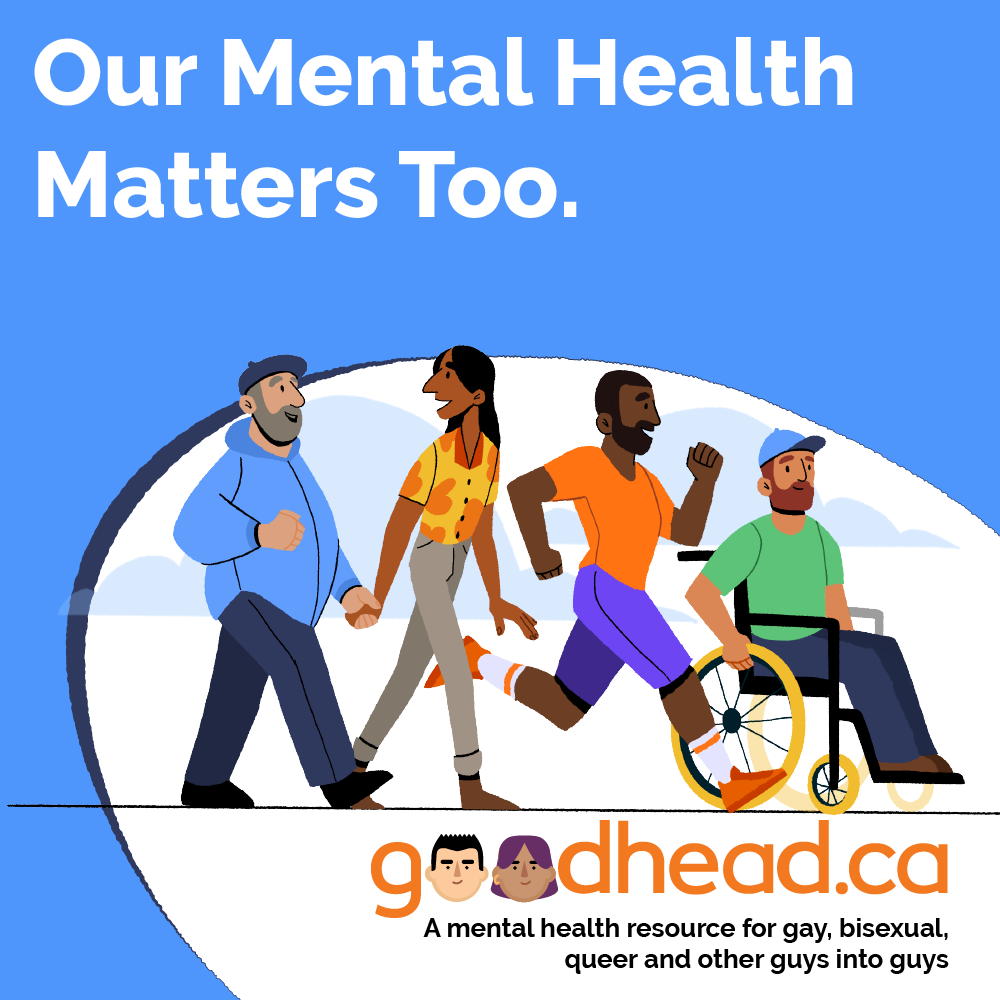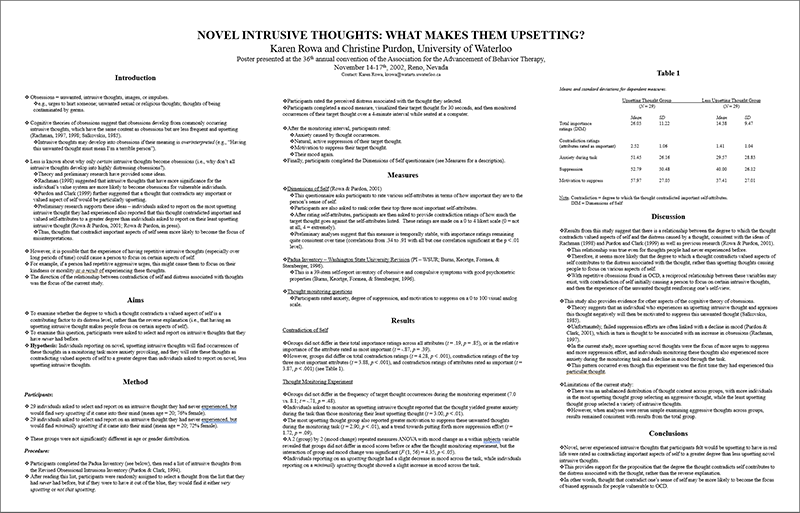Part of the Student Section’s mission is to provide psychology students with valuable resources regarding their education, training and career development.
Here is a growing collection of information provided by the Section Executive that may be useful to students. Browse the Section webpages for more information relevant to psychology students. If there is a topic that that you would like information to be available about, please contact the Section Chair.
NEW What Makes a Compelling Scientific Poster in Psychology?
A guide created by Dr. Karen Rowa, Dr. Nina Josefowitz, and McMaster students Sydney Parkinson, Arij Alarachi and Rei Jamali-far
Presenting one’s research at a conference is a staple of knowledge translation. Two of the authors (KR and NJ) have been privileged to serve as poster judges in a variety of contexts over the course of our multi-decade careers. We were recently judges at a national conference. Over coffee, we started talking about the characteristics of a compelling, interesting, and well-communicated poster. We realized that the existing guidance documents don’t fully capture our experience of being drawn to some posters over others. We decided to create an example that will hopefully provide some guidance for interested readers. The exercise and our reflections are presented in this article.
One thing was clear to this team – we knew what constituted a poster that was clearly not compelling or well-communicated – a poster we might walk right by at a busy poster session! Luckily, the first author (KR) had a few examples from her early career that fit the bill. Her early posters were focused on making sure all of the information was included, with little thought on how to present the data. The poster below, from her early career, is visually unappealing, oversaturated with text, and does not draw the reader towards important aspects of the study or conclusions. Don’t get us wrong – the study is still interesting, but the communication of the study and its results are lackluster. To provide a comparison, three authors (SP, AA, and RJ) used software that is now available to update the poster with the aim of providing a more accessible product, one that might catch a reader’s attention as they walk along the rows and rows of interesting posters at the next conference.
In comparing the two versions, some important differences emerge in the updated version.
- The amount of text is reduced, allowing the reader a better opportunity to digest what is written in a reasonable amount of time while still communicating key points in each section.
- Less text allows the font size to be larger, increasing readability in a physical setting. You have to be able to easily read at least the headings from a few feet away.
- The template used is colourful and engaging. Some researchers will blanch at using something this bold and this is a reasonable and personal perspective. However, the main point that some colour and pattern is better than none still stands.
- Technology allows for the use of QR codes to have ready access to information that is important, but hard to fit. Things like extra details about analyses, the measures used, or references can be accessed using QR codes for the interested reader.
- Visuals replace text in some places, for visual variety and efficiency at conveying concepts.
- A variety of colours and text sizes draws the reader’s eye to certain points of information.
- A key take-home message is highlighted in the centre of the poster, allowing readers to easily digest and hopefully remember the take-away!
We hope this visual comparison is helpful for many, especially students at the beginning of their scientific communication journey.

Updated Poster (PDF)
ARE YOU A PSYCHOLOGY GRADUATE STUDENT?

Are you a PSYCHOLOGY GRADUATE STUDENT that needs to complete a history of psychology course for provincial licensing or to get your grad degree? Or maybe you are just interested in learning how historical concepts are relevant to current issues in psychology?
Either way, you’re covered.
The University of Calgary, in partnership with CPA, is offering a HISTORY AND SYSTEMS OF PSYCHOLOGY (PSYC601) course that examines the history of psychological concepts in Western culture, major theoretical systems of twentieth century psychology and foundational assumptions of theories in contemporary psychology while putting you one step closer to getting licensed in your province. Particular focus is applied to how the history of psychology is linked to current disciplinary discussions about equity, diversity, and inclusion.
Information and registration available through links in poster, UofC-CPA History Course Ad – Feb 9 2023 Final.pdf.
New Mental Health Resource of Sexual Minority Men: Our Mental Health Matters Too
 The Goodhead Website is a a research-based mental health resource for sexual minority men. This knowledge translation project was funded by a Canadian Institutes of Health Research (CIHR) Community Support Grant from the Institute of Gender and Health, with additional support from Dr. Daniel Grace, the Canada Research Chair in Sexual and Gender Minority Health at the University of Toronto. This website was created as a tool to help gay, bisexual, queer and other guys into guys learn more about the social factors affecting their mental health. It offers great navigation tips on how to access and to evaluate mental health care supports in Ontario and functions as well as an advocacy tool to expand mental health services for sexual minorities. The website also serves as resource for health service providers working with LGBTQIA2+ communities.
The Goodhead Website is a a research-based mental health resource for sexual minority men. This knowledge translation project was funded by a Canadian Institutes of Health Research (CIHR) Community Support Grant from the Institute of Gender and Health, with additional support from Dr. Daniel Grace, the Canada Research Chair in Sexual and Gender Minority Health at the University of Toronto. This website was created as a tool to help gay, bisexual, queer and other guys into guys learn more about the social factors affecting their mental health. It offers great navigation tips on how to access and to evaluate mental health care supports in Ontario and functions as well as an advocacy tool to expand mental health services for sexual minorities. The website also serves as resource for health service providers working with LGBTQIA2+ communities.
Link to Website: www.goodhead.ca
Student Internships
The CPA is pleased to post a link to the e-book “Match Made on Earth, 2nd Edition”. It is edited by Dr. Rebecca Pillai Riddell, CPsych (York University) and Dr. Melanie Badali, RPsych (North Shore Stress and Anxiety Clinic). This workbook has been reviewed and financially supported by the Canadian Council for Professional Psychology Programs (CCPPP). Copyright of the workbook, however, rests with its editors. Because the workbook is not a CPA document, it has not been translated into French. The new manual is available free of charge: https://ccppp.wildapricot.org/news/8761509
General Student Resources
- A Collection of Resources in Honour of Psychology Month.
- Workshop presented at the CPA Annual Convention 2010 on career options in psychology: “Where do Psychologists Fit?” English / French
- Workshop presented at the CPA Annual Convention 2013 on applying to graduate school: “Applying to Graduate School in Psychology: A Survival Guide for Students”
- Links to articles published in Psynopsis that may be of interest to students.
- A listing of awards available from CPA for students.
Applying To Canadian Graduate School
Be sure to read the “Psychology Works” Fact Sheet: Applying To Canadian Graduate Schools
Planning a Career in Psychology
Are you planning a career in psychology? If yes, be sure to download Planning a Career in Psychology: A Canadian Perspective for University Bound and Beginning University Students.
Resources for Campus Representatives
Print this poster and display it in your department to attract new CPA student members. French version.
Conduct a presentation (powerpoint presentation and notes) to undergraduate students on Applying to Graduate School. French version (powerpoint presentation and notes).
Ontario Psychological Association Early Career Psychologist Project
This document is a practical organizational guide for Psychological Associations about how to develop and maintain the membership and involvement of early career psychologists in their Association. It is a compilation of the efforts and strategies of the Early Career Psychologist Taskforce in the Ontario Psychological Association (OPA). Many of the ideas and strategies can be broadly applied and modified to meet the needs of both small and large Associations. Click here to download the guide or contact the OPA for more information.
Sites of Interest
Below is a collection of other websites which you may find useful. If you have or know of a website that could be added to this list, please contact the Communcations Officer.
- PsychologyDegreeOnline.net. provides prospective and current students with tons of information about all the different psychology programs that they can choose from. The site also offers an array of resources such as specializations, scholarships, certifications, careers, as well as the different degree options.
- Affordable Colleges Online
- American Psychological Association
- Association of Universities and Colleges of Canada
- Association of Psychology Postdoctoral and Internships Centers
- Peterson’s Education Portal–College, Graduate Program, Test preparation, SAT, Scholarship, Financial Aid, Distance Learning
- Canadian Scholarship Database
- Canadian Institutes of Health Research
- Careers in Psychology
- Journal of Interpersonal Relations, Intergroup Relations and Identity (JIRIRI). This project is a student initiative that offers a unique opportunity for undergraduate students to fully experience the publication process.
- Natural Sciences and Engineering Research Council of Canada
- Psychology Career Center: A Psychology Career Guide
- Social Sciences and Humanities Research Council of Canada
- Simply Psychology
- Online Degrees
- Universities Canada
Summaries of results of two recent surveys on interprofessional education are available:
- Students’ Perspectives on Interprofessional Education in Canadian Graduate Psychology Programs
- Lee, C.M., Schneider, B.H., Bellefontaine, S., Davidson, S., Robertson, C. (2012). Interprofessional collaboration: A Survey of Canadian psychologists and psychiatrists. Canadian Psychology, 53 (3), 159-164. Note: CPA members can download this article by logging into the CPA’s Members Only Area.

